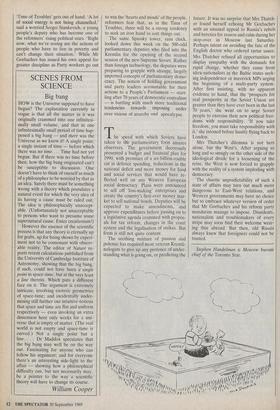SCENES FROM SCIENCE
Big bang
HOW is the Universe supposed to have begun? The explanation currently in vogue is that all the matter in it was originally crammed into one infinitesi- mally small volume, and that in one infinitesimally small period of time hap- pened a big bang — and there was the Universe as we know it! A single point; a single instant of time — before which there was no time.... Time had not yet begun. But if there was no time before then, how the big bang originated can't be susceptible to discussion. One doesn't have to think of oneself as much of a philosopher to be worried by that as an idea. Surely there must be something wrong with a theory which postulates a natural event for which the very idea of its having a cause must be ruled out. The idea is philosophically unaccept- able. (Unfortunately not unacceptable to persons who want to presume some supernatural cause. Enter creationism!) However the essence of the scientific process is that any theory is eternally up for grabs, up for being shown by experi- ment not to be consonant with observ- able reality. The editor of Nature re- ports recent calculations published from the University of Cambridge Institute of Astronomy, showing that the big bang, if such, could not have been a single point in space-time, but at the very least a line therein. Which puts a different face on it. The argument is extremely intricate, involving esoteric geometries of space-time; and incidentally under- mining still further our intuitive notions that space and time are flat and uniform respectively — even invoking an extra dimension here only works for a uni- verse that is empty of matter. (The real world is not empty and space-time is curved.) Not a single point but a line. . . . Dr Maddox speculates that the big bang may well be on the way out. Fascinating for anyone who can follow his argument; and for everyone there's an interesting side-light to the affair — showing how a philosophical difficulty can, but not necessarily may, be a pointer to the way a scientific theory will have to change its course.
William Cooper


























































 Previous page
Previous page